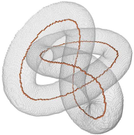We present an attempt to build an axiomatic approach to combinatorial topology. The purpose is to introduce a ground set of definitions which allow us to describe structures and to derive basic constructions relative to that field. A main ingredient of our project is the notion of completion. Completions are inductive properties which may be expressed in a declarative way and which may be combined. Intuitively, a completion may be seen as a rewriting rule acting on sets.
In this talk, we first introduce two completions in order to define a remarkable collection of acyclic simplicial complexes, namely the collection of dendrites. We give few basic properties of this collection. Also, we present a theorem which shows the equivalence between this collection and the one made of all simplicial complexes which are acyclic in the sense of homology.
Then, we introduce several completions for describing dyads. A dyad is a pair of complexes which are, in a certain sense, linked by a "relative topology". We give some basic properties of dyads, and introduce a second set of axioms for relative dendrites. We establish a theorem which provides a link between dyads, relative dendrites, and dendrites.
At last, using again the framework of completions, we propose an extension of simple homotopy by considering homotopic pairs. Intuitively, a homotopic pair is a couple of objects (X,Y) such that X is included in Y and (X,Y) may be transformed to a trivial couple by simple homotopic deformations that keep X inside Y. Thus, these objects are linked by a "relative homotopy relation". Our main result is a theorem that makes clear the link between homotopic pairs and dyads. Thus, we prove that, in the unified framework of completions, it is possible to handle notions relative to both homotopy and homology.
- Poster

 PDF version
PDF version
